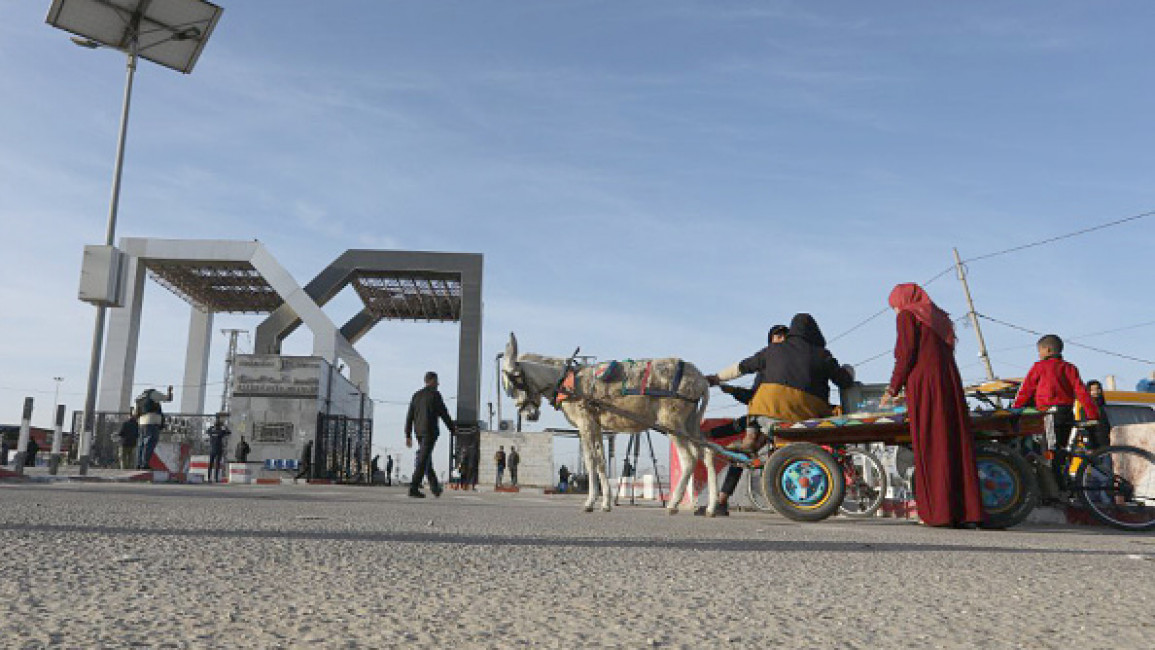What will happen to Gaza's only border crossing after Israel's attack on Rafah?
Thousands of Palestinians waiting for their turn to leave Gaza through the Rafah border crossing are now trapped in the besieged war-torn coastal enclave as the Israeli army stormed the only link for Palestinians to the outside world.
In the early morning of Tuesday, 7 May, the Israeli army stormed the Rafah border crossing with military tanks, seizing control and raising the Israeli flags at the entrance.
The Israeli attack came after a heavy night of clashes with the armed Palestinian fighters, who tried to prevent the army from reaching the border.
During the night, according to Palestinian security sources and locals, the Israeli warplanes carried out dozens of attacks on Rafah city, including the surrounding border.
On Monday, the Israeli army forcibly evacuated thousands of Palestinian residents from their houses located in the eastern parts of Rafah city in the southern parts of the war-torn Gaza Strip.
Al-Salam, Al-Jeneina, Tabba Zaraa and Al-Byouk, as well as blocks of 10-16, 28, and 270, were among the main areas that must be evacuated immediately, according to leaflets dropped by Israeli aircraft.
"The Israeli army will work with extreme force against the terrorist groups of Hamas in (these) neighbourhoods," Avichai Adaraee, the spokesperson of the Israeli army, claimed in a press statement released on his account on X.
Rafah border crossing area is among multiple sites that Palestinians were told by Israel they must evacuate. As a result, the residents in Gaza feared that if the army attacked the territory, the border would be sealed.
Palestinian official sources, who preferred not to mention their names, remarked to TNA that the Israeli army invasion of Rafah had already started since yesterday when the Israeli Prime Minister vowed not to end the war in Gaza and will not abide by any pressures to end the conflict in Gaza.
"Netanyahu is keen to not end the war in a bid to keep his control in Israel by any price," a Ramallah-based Palestinian official, who prefers to speak under anonymity, said to TNA.
"Without invading Rafah, Netanyahu (believes) will appear as a weak politician who has not achieved any goals, at least in front of his extreme-right-wing supporters," the official added.
Still, this means that the Rafah border crossing may be directly attacked by the Israeli army (as done with the Erez crossing) under the pretext of preventing any member of Hamas from escaping the coastal enclave.
An 'open-air prison' for 2.3 million people
Currently, about 2.3 million people are trapped in what many commentators and human rights groups have described as 'an open-air prison' as Israel prevents them from leaving the coastal enclave, which has been under a ruthless Egyptian-Israeli blockade for more than 17 years.
"We do not know what will happen in the upcoming hours, but closing the borders means that thousands of severely injured will face death as none of them can leave Gaza for treatment," Wael Abu Omer, the spokesperson of the border, told TNA.
"The Israeli occupation insists on indiscriminately punishing all our people in Gaza. They (Israelies) only want to restrict all the life on us," he said.
According to official announcements issued by the Crossings and Borders Authority, more than 300 trucks loaded with humanitarian aid, goods, fuel, and cooking gas entered the Gaza Strip daily.
However, these quantities were not sufficient for the residents of the Gaza Strip, especially since their daily need (at regular times) exceeded 600 trucks, given the region's high population density.
UN and international organisations have warned of the adverse effects left by these quantities, which are not appropriate for the population and have increased the rate of famine in the region, especially in northern Gaza, which was subjected to the worst siege that lasted for months and caused the death of dozens of residents from malnutrition and starvation.
Residents of the central and southern regions, where more than 1.9 million people are gathered, will face the same situation if aid, medicines and fuel are not brought to hospitals.
Netanyahu said on Sunday that Israel could not accept ending the war and "leaving Hamas intact" despite earlier hopes that a deal could see the release of Israeli hostageshttps://t.co/4BSgWRaOqH
— The New Arab (@The_NewArab) May 7, 2024
Rafah hospitals face an unknown fate
According to medical sources, the invasion of Rafah may be accompanied by the invasion of Abu Youssef al-Najjar and the European Hospital, the only two hospitals in the area remaining in operation. This would mean taking them out of service, as Israel had done with Nasser Hospital in Khan Yunis, al-Shifa Hospital in Gaza City and all the hospitals in the northern Gaza Strip.
Removing Rafah's hospitals from service would be a death sentence to tens of thousands of wounded who are currently receiving treatment.,
"It seems that Israel wants to complete its destruction for all life in Gaza," says one of the medical personnel who preferred to remain anonymous for fear of Israeli persecution.
"No matter what Israel does and no matter how much its crimes increase, we will not leave our patients alone to face death. We are here to serve our people, whatever the cost," he added.







 Follow the Middle East's top stories in English at The New Arab on Google News
Follow the Middle East's top stories in English at The New Arab on Google News


